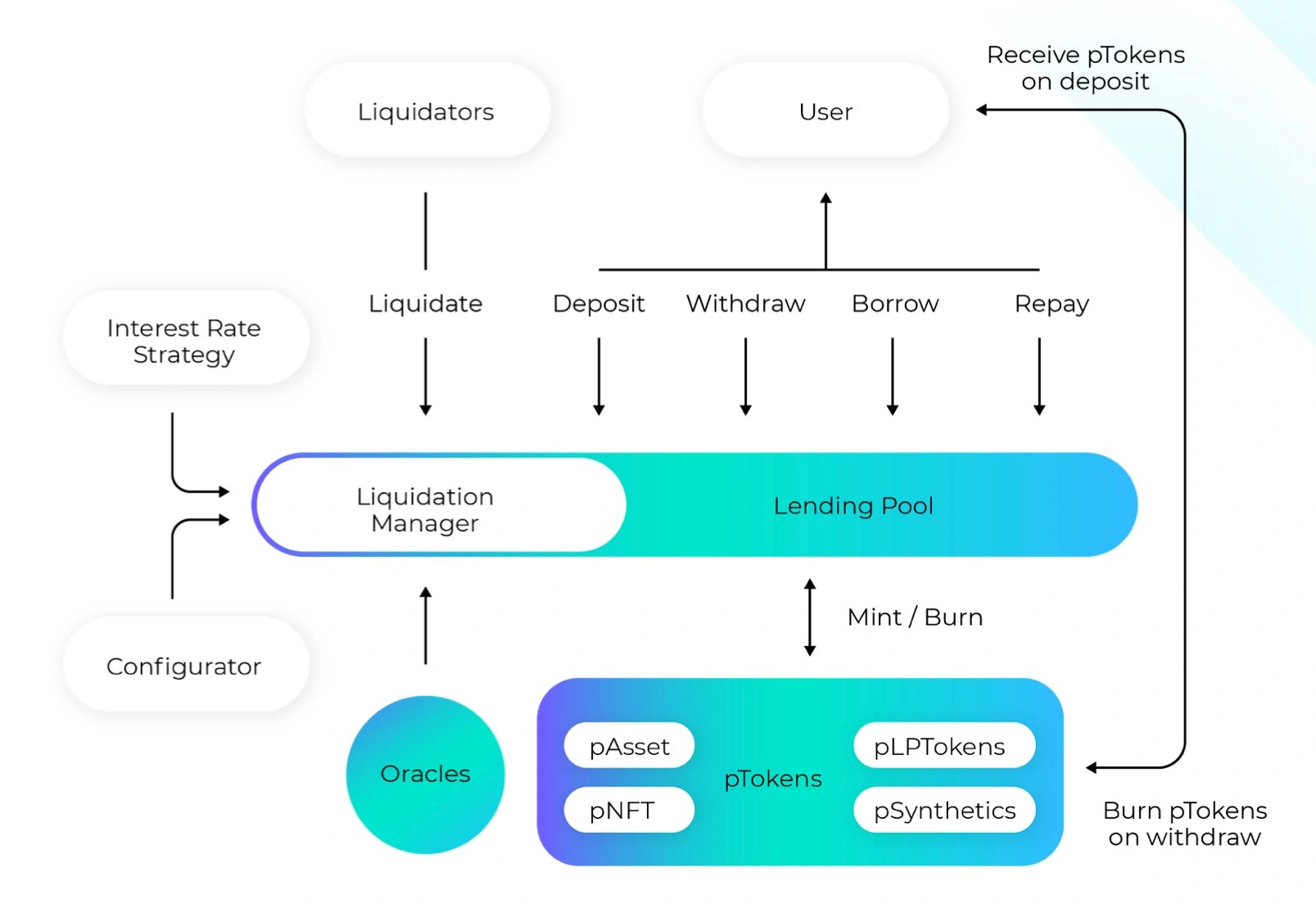위키 구독하기
Share wiki
Bookmark
Paribus
0%
Paribus
Paribus는 디지털 자산, NFT, 유동성 포지션을 포함한 기존 및 비전통적인 암호화 자산에서 가치 추출을 용이하게 하도록 설계된 분산형 크로스체인 프로토콜입니다. [1]
개요
Deniz Dalkilic, Wilson Davis, Simon Kruse가 2020년에 설립한 Paribus는 NFT, 유동성 포지션, 실물 자산 및 합성 자산을 포함한 기존에 흔하지 않은 암호화 자산에서 가치를 창출하는 것을 목표로 하는 분산형 크로스체인 대출 및 차입 프로토콜입니다. AI 기반 NFT 가치 평가 오라클을 사용하여 피어 투 피어 매칭이 아닌 유동성 풀을 통해 확장 가능한 대출을 용이하게 합니다.
이 프로토콜은 상호 운용 가능하고 블록체인에 구애받지 않도록 설계되어 다양한 생태계에서 자산과의 상호 작용을 가능하게 합니다. 탈중앙화 금융 내에서 사용을 확장하기 위해 디지털화 가능한 자산의 잠재력을 탐구하고자 합니다. [1] [2] [3] [4] [5] [6]
특징
Paribus는 유동성을 개선하고 여러 자산 범주에 걸쳐 기회를 창출하는 데 중점을 둔 분산형 금융 솔루션을 제공하는 것을 목표로 합니다. 상호 운용 가능한 프로토콜은 대체 불가능한 토큰(NFT), 실물 자산(RWA), 유동성 공급자(LP) 토큰, BTC, ETH 및 USDC와 같은 기존 암호화폐를 포함한 자산에 대한 탈중앙화 금융(DeFi) 시장에 대한 접근성을 용이하게 하고자 합니다. [7] [8] [9]
NFT 담보화
이 플랫폼은 NFT 소유자에게 담보 대출을 통해 유동성에 접근할 수 있는 기능을 제공하여 다른 목적으로 대출을 활용하면서 디지털 자산에 대한 소유권을 유지할 수 있도록 하는 것을 목표로 합니다. [7] [8] [9]
실물 자산
Paribus는 국채, 토큰화된 부동산, 보관된 자산과 같은 토큰화된 실물 자산(RWA)에 대한 DeFi 시장의 유동성 문제를 해결하는 것을 목표로 합니다. 이 플랫폼은 사용자가 청산 위험을 최소화하면서 이러한 자산을 담보로 활용할 수 있도록 하는 것을 목표로 합니다. [7] [8] [9]
LP 토큰 유틸리티
Paribus는 LP 토큰을 담보로 통합하여 생성된 수익이 차입 금액 상환에 기여하는 자체 상환 대출과 같은 기능을 제공하는 것을 목표로 합니다. 이 접근 방식은 LP 보유의 유틸리티를 향상시키는 것을 목표로 합니다. [7] [8] [9]
차입 및 대출
이 프로토콜은 환율 메커니즘을 통해 이자를 축적하는 pToken을 사용하여 차입 및 대출을 용이하게 하는 것을 목표로 합니다. 이 접근 방식은 사용자가 자산 보유를 유지하면서 수동적 수익을 얻을 수 있도록 설계되었습니다. [7] [8] [9]
스테이킹
이 프로토콜은 PBX 토큰 보유자를 위한 스테이킹 기회를 제공하여 참가자가 보상을 받기 위해 지정된 기간 동안 토큰을 잠글 수 있도록 하는 것을 목표로 합니다. 스테이킹 메커니즘은 잠금 기간과 풀 크기에 따라 다양한 수준의 연간 백분율 수익률(APY)을 제공하도록 구성되어 있습니다. [7] [8] [9]
아키텍처
Paribus의 아키텍처는 기능, 보안 및 효율성을 제공하는 것을 목표로 하는 스마트 계약을 중심으로 구성됩니다. 컨트롤러 계약은 상호 작용을 용이하게 하고 유동성, 담보 요소 및 오라클 가격 피드를 기반으로 자산 화이트리스트를 감독합니다. 오라클은 분산형 가격 데이터를 제공하고, 청산 관리자 계약은 담보 가치가 필요한 수준 이하로 떨어질 때 대출을 처리합니다.
이 프로토콜은 pToken을 사용하여 사용자 잔액을 나타내어 이자 발생 및 담보화를 가능하게 합니다. 이자율은 미리 정의된 전략에 따라 전용 계약을 통해 조정됩니다.
Paribus는 EVM 및 비EVM 블록체인을 모두 지원하기 위해 크로스체인 통신을 위해 LayerZero 및 Everclear를 통합합니다. 맞춤형 분산형 오라클을 통해 정확한 자산 가격 책정을 보장하는 것을 목표로 합니다. 거버넌스 계획은 DAO로 발전하는 과정의 일환으로 프로토콜 제어를 PBX 토큰 보유자에게 이전할 것을 제안합니다. [7]

토큰노믹스
Paribus 토큰($PBX)
PBX는 Paribus의 거버넌스 토큰으로, 보유자가 프로토콜 결정을 제안하고 투표할 수 있도록 합니다. 이해 관계자와 프로토콜의 이해 관계를 일치시키는 것을 목표로 하는 동시에 보유자에게 스테이크 크기에 따라 프로토콜 수수료의 일부를 제공합니다. [10]
할당
Paribus는 총 100억 개의 PBX 토큰을 보유하고 있으며 다음과 같이 분배됩니다.
- 판매: 40억 PBX(40%)
- 생태계: 33억 PBX(33%)
- 재단: 15억 PBX(15%)
- 전략/자문: 7억 PBX(7%)
- 유동성 제공: 5억 PBX(5%) [11]
거버넌스
Paribus 프로토콜은 PBX 토큰, 거버너 위임자 모듈 및 타임락의 세 가지 구성 요소를 통해 PBX 토큰 보유자가 관리하는 것을 목표로 합니다. 이러한 구성 요소를 통해 커뮤니티는 시스템 매개변수 조정 또는 새로운 기능 도입과 같은 변경 사항을 제안, 투표 및 구현할 수 있습니다. PBX 토큰 보유자는 토큰을 스테이킹하여 투표권을 얻을 수 있으며, 제안서를 제출하려면 최소 1천만 표의 투표권이 필요합니다. 투표는 5일 동안 진행되며, 제안서가 과반수를 획득하고 최소 1억 표를 얻으면 타임락에 대기열에 추가되어 3일 후에 구현할 수 있습니다. 프로토콜 변경 사항은 최소 10일 후에 적용되도록 설정되어 있습니다. [12]
잘못된 내용이 있나요?
